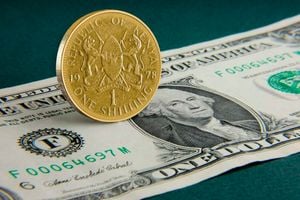
President William Ruto’s economic advisor David Ndii.
The weakening of the Shilling is not that bad after all — that is if you believe recent social media posts by President William Ruto’s outspoken economic advisor David Ndii, who seems to have had a Eureka moment.
Dr Ndii seems to blame the rich’s obsession with exotic imported items for piling pressure on the dwindling reserve of foreign currencies. He describes these elites as “Upper Deck People”.
“My apologies to #UpperDeckPeopleKe that fresh Atlantic Salmon price is up 40 per cent,” Ndii posted on X.
“Not only is tilapia still affordable, it puts money in people’s pockets. Also, no carbon footprint,” he went on.
Earlier he wondered why foreign exchange (forex) reserves, earned by exporters such as tea farmers, should be used to import grapes and oranges for the rich. And, yes, Pixie oranges — those juicier, seedless yellow-orange type of oranges — are mostly imported.
Ndii’s thinking — the latest excuse for the depreciation of the Shilling which seems to be going back on President William Ruto’s promise to bring down the exchange rate with the dollar to as low as Sh115 — is that a higher price of imported Pixie oranges, grapes and Atlantic Salmon fish and other imported items will nudge consumers into consuming locally produced varieties.
Developing countries keen to help their infant industries grow often deliberately implement this policy, known as import substitution, through a variety of tactics such as tariffs, import quotas and subsidized government loans. Countries with a fixed exchange rate (Kenya says it maintains a floating exchange rate) can also achieve import substitution by devaluing their currency.
A depreciated Shilling can also signal to exporters to produce more as the cost of a country’s exports is reduced making imports less attractive. As exports increase and imports decrease, there is typically a better balance of payments as the trade deficit shrinks.
Ideally, the additional forex earning from the exports should offset the loss from the expensive imports.
The Dr Ruto-led government has had all the reasons to stabilise the currency, not only because a weak Shilling means expensive inputs such as fuel and fertilizer, it also means high debt service costs for the many dollar-denominated loans.
But after months of unsuccessfully trying to arrest this free fall, the government’s top advosor seems to have latched onto a new straw: A weak Shilling is good for the local production, as the country imports only that which is not available locally.
There is certainly some logic in this philosophy, but the reality is far more complex, according to experts.
Ken Gichinga, an economist, reckons the argument is not entirely accurate.
“It (the argument) assumes that there are comprehensive reforms to improve the factors of production, which is not the case. For example, capital formation is not taking place as more companies enter loss making territory,” says Gichinga.
Moreover, starting an enterprise so as to reap the dividend of increased domestic consumption, has been hampered by a high cost of credit, added Gichinga.
But perhaps the biggest counterargument to the idea that a weak Shilling will lead to increased local production and exports is, paradoxically, that a weak Shilling also leads to high cost of local production.
The East African Breweries Limited (EABL), the region’s largest alcohol manufacturer, recently reported a 22 per cent drop in net profit in the six months to December to Sh6.7 billion, largely due to increased cost of raw materials such as barley and ethanol.
Due to drought in the region, EABL was forced to import most of these raw materials thus paying a steeper price due to the weakening of the Shilling.
Consequently, the listed company’s foreign exchange losses due to the depreciation of the Shilling increased ten-fold to Sh2.3 billion.
Most inputs used in local production are imported. Thus a weak Shilling results in the cost of production of tea, for example, going up.
For example, fertiliser prices had skyrocketed for some time, thanks in large part to the war in Ukraine and the lingering effects of Covid-19 pandemic. Dr Ruto’s government has since launched a fertiliser subsidy programme to reduce the cost of production to farmers.
Moreover, the gain from a weak Shilling might have been wiped out by increased production of tea by other producers, with global tea prices dropping by eight per cent.
This year there is likely to be a further dip in prices of tea by two per cent, reflecting robust leaf supplies including from Indian and East African producers, according to the World Bank’s latest Commodity Markets Outlook.
The cost of exporting avocado also seems to have been affected a steep rise in prices of imported uncoated Kraft paper, used to make special cartons for packaging these fruits.
And while countries such as Uganda and Ethiopia have expanded their efforts to increase the availability of locally produced yarn fabric for making textile and apparel, Kenya still imports this critical input for knitting, according to a World Bank report.
“While the cost structure of apparel companies varies significantly by firm size, for the larger companies, the high cost of imported material (which is a fixed cost due to the absence of export-quality fabric in Kenya) contributes to the majority of the manufacturing cost (approximately 64 per cent,” said the World Bank.
While it is true that Kenya imports finished goods that could easily be produced locally, Kenya also imports fuel, machinery, chemical fertilizers, tractors, computers which it does not have the comparative advantage of producing but which are critical for the production process.
“Our largest imports are petroleum and capital goods which are things we can’t possibly substitute. How does his (Ndii’s) logic stack up against this?” wondered Johnson Nderi, a financial analyst.
Add the high cost of labour and electricity and you have a perfect storm that makes it hard for the country to achieve import substitution through a depreciated Shilling.
This partly explains why the Kenyan exports have not done so well despite the weakening of the Shilling.
According to the International Monetary Fund (IMF) Kenya’s exports underperformed last year because exporters struggled to obtain hard currency to import intermediate goods which are usually processed to create exports.
“Exports are projected to have underperformed in 2023 due to forex market dysfunction, for example, through increased transaction costs of securing FX (foreign exchange) for imported intermediate goods,” the IMF stated.
According to Ndii, the country seems to have started reaping the dividend of expensive imports as the trade deficit (the difference of imports from exports) has been narrowing as Kenyans shun expensive imports. An intermediate good is a good or service used in the eventual production of a finished product.
Ronny Chokaa, a Senior Research Analyst at AIB-AXYS Africa, an investment bank, insists that trade deficit is a function of both prices and volumes.
“While it is true that the volume of imports, especially machinery declined notably in 2023, the prices of those imports soared over the same period,” said Chokaa.
The increase in price, he explained, offset the benefit lower volumes.
“This contributed to a marginally expanded import bill, despite the lower volumes imported,” added Chokaa.
Months after the Kenya Kwanza administration came to power, Dr Ndii was one of the architects of the controversial fuel import scheme. The overarching goal of the scheme is to stabilise the exchange rate and increase the availability of dollars.
During the unveiling of the government-to-government scheme in April last year President Ruto made noted that allowing oil marketing companies to pay for fuel in Kenyan Shillings would ease pressure on the dollar reserves.
“In fact in the next one month or so you will see the dollar exchange rate coming down in a very phenomenal way. In fact, in my estimation, in the next couple of months, the exchange rate will come below Sh120, maybe Sh115,” said Ruto.
However, the Shilling has not strengthened and was exchanging at Sh165 by end of Friday.










